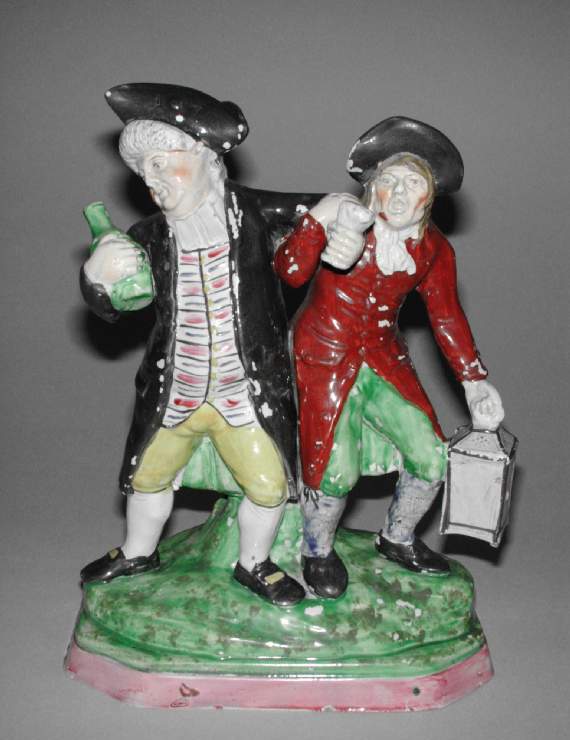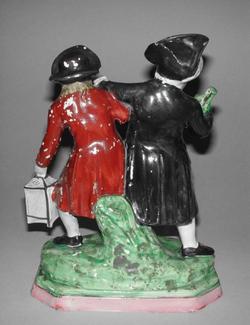Current Location: In storage
Titles
Parson and Clerk or the Vicar and Moses
Maker(s)
Production:
Unidentified Staffordshire factory
Entities
Categories
Description
Lead-glazed earthenware painted in polychrome enamels. An inebriated parson clutching a bottle being led by the parish clerk holding a lantern
Off-white earthenware, moulded, covered with slightly blue-tinted lead glaze, and painted in blue, green, yellow dark pink, flesh tones, reddish-brown, brown, grey, and black enamels. The figures stand on a grassy mound with a tree trunk at the back, rising from an elongated pink octagonal base which is hollow underneath and partially covered with blue-tinted glaze. The Clerk, on the viewer's right, has a ruddy complexion and brown hair, and wears a black hat, reddish-brown coat, green breeches, blue stockings and black shoes, and holds a lantern in his left hand. He grasps the parson's left arm to steady him and lead him to the churchyard.The parson, wears a black tricorn hat over a bluish-white wig, a black jacket, a pink and blue horizontally striped waistcoat with yellow buttons, yellow breeches, white stockings and black shoes with yellow buckles. He looks down and leans away from the clerk, holding a glass in his left hand, and clutching a green bottle to him with his right hand. He stands on his left leg and drags his right behind him as if unsteady and not wanting to go forward.
Notes
History note: Sotheby's, 12 March, 1909, lot 161; purchased for £2.16s. by S. Fenton, Cranbourn Street, London, with 10% commission on behalf of Dr J.W.L. Glaisher, FRS, Trinity College, Cambridge.
Legal notes
Dr J. W. L. Glaisher Bequest
Measurements and weight
Height: 23.2 cm
Length: 18.6 cm
Acquisition and important dates
Method of acquisition: Bequeathed
(1928-12-07)
by
Glaisher, J. W. L., Dr
Dating
19th Century, Early
George III
Circa
1800
-
1815
Note
This group was first made in the late 1780s or early 1790s, but the bold, rather crudely applied colouring indicates that this example was probably made in the early nineteenth century. It may have been made in the factory of Enoch Wood and James Caldwell at Burslem. The theme of the group derives from a song, 'The Vicar and Moses' published in 1773 by Charles and Samuel Thomson in London. The earliest known illustration of 'The Vicar and Moses' appeared above the title and verses on a broadsheet attributed to Thomas Colley published in January 1782 by Hannah Humphrey, a London print shop owner. An example of the ballad is in the British Museum (inv. no. 1872,1012.4907). Although the print is a more cruelly anticlerical satire showing an immensely stout vicar and a wretchedly thin clerk holding a lantern, it was probably the inspiration for this Staffordshire group. Another print with differently represented characters appears as decoration on creamware jugs and mugs. It was published by Bowles & Carver after Robert Dighton (1752-1814) in 1785. (British Museum inv. 1935,0522.1.174)
In the song, the Vicar is called out to undertake the burial of a baby, which, as parish registers show, was an all too frequent occurrence in that era because of the high infant mortality rate. The satirist shows the vicar as a bon viveur, who forgetting his religious duties, and the sorrowing parents, has to be dragged out of the village inn where he has been drinking and smoking, to go to the churchyard to attend the burial. But on arrival, is too inebriated to read the service and the infant is interred without it. The theme reflects the high level of anti-clerical sentiment in the late 18th century.
A probably earlier group on a lower base and with less garish colouring is in the Willett Collection in the Brighton Museum (Willett Collection no. 807), and one with a mound base similar in shape to the Fitzwilliam's is in the Victoria and Albert Museum (inv. no. 298-1969).
People, subjects and objects depicted
Components of the work
Decoration
composed of
enamels
( blue, green, yellow dark pink, flesh tones, reddish-brown, brown, grey, and black)
Surface
composed of
lead-glaze
( slightly blue tinted; unevenly applied leaving bare patches on the underside of base)
Base
Length 17.8 cm
Materials used in production
off-white
Earthenware
Techniques used in production
Moulding
: Off-white earthenware, moulded, covered with slightly blue-tinted lead-glaze, and painted in blue, green, yellow dark pink, flesh tones, reddish-brown, brown, grey, and black enamels
Inscription or legends present
Inscription present: rectangular white paper stick on label with a blue line edging on left side and plant motifs in the two top corners.
- Text: No 3009/Staffordshire/group of the/Parson and/Clerk./A good specimen/of this group./b. at Sotheby's/March 12 1909.
- Location: On back of underside of base
- Method of creation: Hand-written in black ink
- Type: Label
References and bibliographic entries
Identification numbers
Accession number: C.917-1928
Primary reference Number: 76358
Old object number: 3008
Stable URI
Audit data
Created: Saturday 6 August 2011
Updated: Tuesday 27 August 2024
Last processed: Tuesday 29 July 2025
Associated departments & institutions
Owner or interested party:
The Fitzwilliam Museum
Associated department:
Applied Arts





